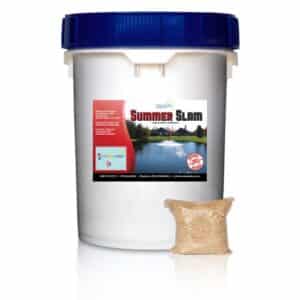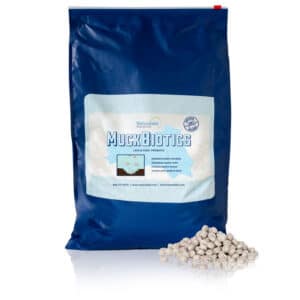Due to urban sprawl and ongoing land development, surface water management is more important than ever. The pond management industry is ever evolving to keep pace. Scientific researchers are constantly searching for new tools to combat poor water quality. Several products have been brought to market to counteract the two biggest issues affecting community ponds today: nutrient pollution and organic sediment buildup. Collectively, these two processes lead to “eutrophication”. Highly eutrophic ponds are characterized by shallow water, frequent and excessive weed/algae growth, bad odors, and a decline in beneficial aquatic life.
Reduce Algaecide/Herbicide Costs!

Beneficial Pond Bacteria by Natural Lake Biosciences
Most of these new products are biological treatments that have no adverse side effects on the environment. They consist of beneficial bacteria and bio-stimulants that target the cause of the problem rather than the symptoms. Therefore, they are proactive rather than reactive in their approach to pond management. These products reduce nutrients that fuel excessive algae growth and expedite the natural breakdown of organic sludge at the pond bottom. Unlike traditional aquatic algaecides and herbicides, they must be applied in regular maintenance doses to be effective.
Unfortunately, all ponds are different and do not respond equally to proactive management. Inherent design flaws can minimize the effects of biological treatments. Ponds that are built extremely shallow and/or those that receive nutrients from a polluted ground water source may continue to suffer from eutrophication. It should also be noted that muck reducing biologicals only address organic sludge and have no effect on soil based sediment caused by excessive runoff and erosion. All biological treatments work best in the presence of oxygen; however, it is not necessary to have a fountain or bottom aeration system when using these products.
Implement Biologicals into Your Current Management Plan

Sludge Reducing Probiotics by Natural Lake Biosciences
Proactive measures are not meant to take the place of traditional pond management tools like algaecides, herbicides, and pond colorants. However, they can be incorporated into a master Integrated Pest Management Plan (IPM) that is both effective and environmentally sensitive. As with all non-chemical controls, there are no guarantees as to their effectiveness. However, scientific research shows them to be beneficial in reducing the frequency and severity of algae outbreaks and reducing organic muck. The best way to monitor the effectiveness of proactive treatments is through periodic monitoring of nutrient levels and sludge accumulation. Success will ultimately be judged by improvements in the aesthetic quality of the pond over time.
Call Magnolia Fisheries today to incorporate proactive measures into your pond management plan!
